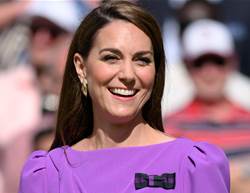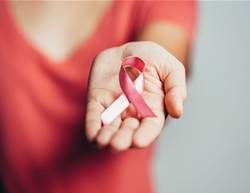Australian model Elle Macpherson has recently revealed that she is in remission from breast cancer. The star has courted controversy by sharing in her memoir that she went against medical advice on cancer treatment and relied on alternative therapies.
What kind of cancer did she have?
Macpherson, 60, had a type of cancer called HER2-positive oestrogen receptive intraductal carcinoma, reports The Guardian. Around 20% of breast cancers are HER2 positive.
Breast cancer surgeon Associate Professor Sanjay Warrier says that while every case is different, for this type of cancer the usual treatment would be chemotherapy with targeted therapies first, and then surgery to prevent a return of the cancer. This has proven very effective.
"In HER2-positive disease using dual treatments has led to six to seven out of 10 patients not having cancer on at the time of surgery," he says. "We have a lot of effective therapies personalised to different breast cancer subtypes and are getting improved outcomes for patients that present early."
Macpherson did have a lumpectomy to remove the cancer, reports The Conversation. She then “holistically treated” her cancer with a doctor, naturopath, holistic dentist, osteopath, chiropractor and two therapists, according to The Guardian.

What do the experts say?
Assoc Prof Warrier says Macpherson sought medical opinions and made her own choice.
“I respect Elle’s personal journey. Going through a diagnosis is incredibly tough and she is at peace with her decision making. I don’t know enough around the specifics of her case.
“One thing with going through a diagnosis of cancer is that it is like going through stages of grief and shock and can be very difficult. It is also a foreign world when you are thrust into a medical world. Suddenly you have to make life altering decisions in a space of a few weeks. All I would say is that depending on the clinical vignette it is important to remember that your medical colleagues are part of your team to work out the best treatments for you.”
Assoc Prof Warrier is concerned that Macpherson sharing her alternative approach might influence others who have a different type of cancer or who require different treatment.
“There are treatments that we know work so well. I think it's really important that [people] work with their medical professionals to ensure they are getting the best possible treatments, weighing up the risks and benefits of treatments.”
Macpherson needs to be on guard for breast cancer reoccurrence, adds Professor Fran Boyle, Professor of Medical Oncology at the University of Sydney and a member of oncology research group Breast Cancer Trials.
“I can say that I could understand her decision to not want a mastectomy even with reconstruction. Everyone’s body shape and needs must be taken into account when weighing up the options for breast cancer treatment. I would have plenty of fat to replace a breast, Elle not so much.
“What worries me is that her risk of recurrence was not managed in the conventional way, and I hope she is under close surveillance. It is good that she is managing her general health well, and also managing stress and anxiety which are inevitable after a breast cancer diagnosis.”
What role do alternative therapies play in breast cancer treatment?
“No alternative therapies have been proven to be effective in treating [this type of cancer] or preventing breast cancer,” confirms Prof Boyle.
Breast Cancer Network Australia released a statement that indicated that while healthy habits can help you through breast cancer, it’s important to speak to healthcare professionals for an effective treatment plan.
“While a healthy lifestyle, including good nutrition, exercise, and mental wellbeing, plays a role in cancer care, we emphasise the importance of consulting healthcare professionals and relying on the expertise of your treatment team to make informed decisions for you.”
Assoc Prof Warrier reinforced that for any type of cancer, treatment is performed as part of a medical team, with the patient front and centre so they feel supported and informed.
“Ultimately any alternative therapies need to work hand in hand with traditional therapies. Synergy is important rather than picking one or the other.
“I feel it is important to continue to encourage people to understand the benefits of modern medicine despite them not always being the most comfortable. They do offer the best outcomes.
“When it comes to the idea of alternative solutions, it is important for them to be considered in partnership with conventional medicine because conventional treatments are incredibly effective.”
Macpherson defended her memoir on the Today show: "It's important to mention that I am not giving advice to other people. I'm sharing my experience ... and the chapter itself isn't really about cancer. It's about how to make a decision when you're gripped with fear and adversity," she said.
For more information about breast cancer, visit the Breast Cancer Network Australia.










